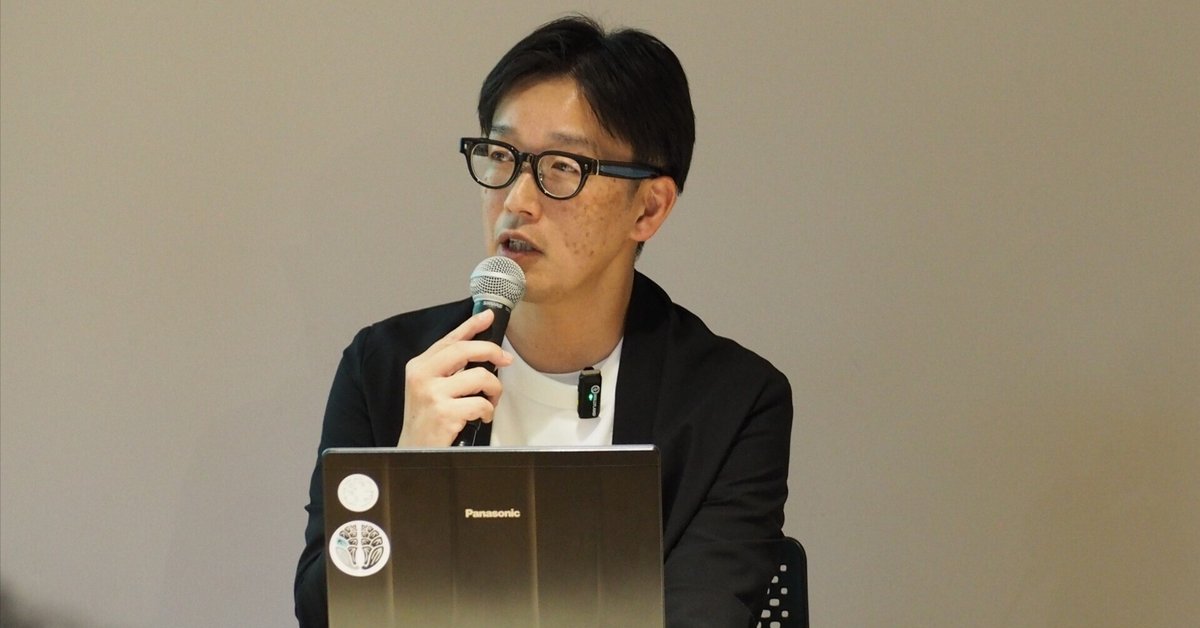
【Report on Entrepreneurship Seminar】Part2 ~Town Planning ✖ Noto Reconstruction~
Hello, everyone!
In this article, we will summarize the second part of the Entrepreneurship Seminar held on Saturday, October 5, 2024. In the second part, we invited Mr. Kentaro Tada, President and CEO of Tadaya Ryokan, Wakura Onsen, as a guest and held a panel discussion on the theme of "Town Planning ✖ Noto Reconstruction." Please read it to the end!
Guest Introduction
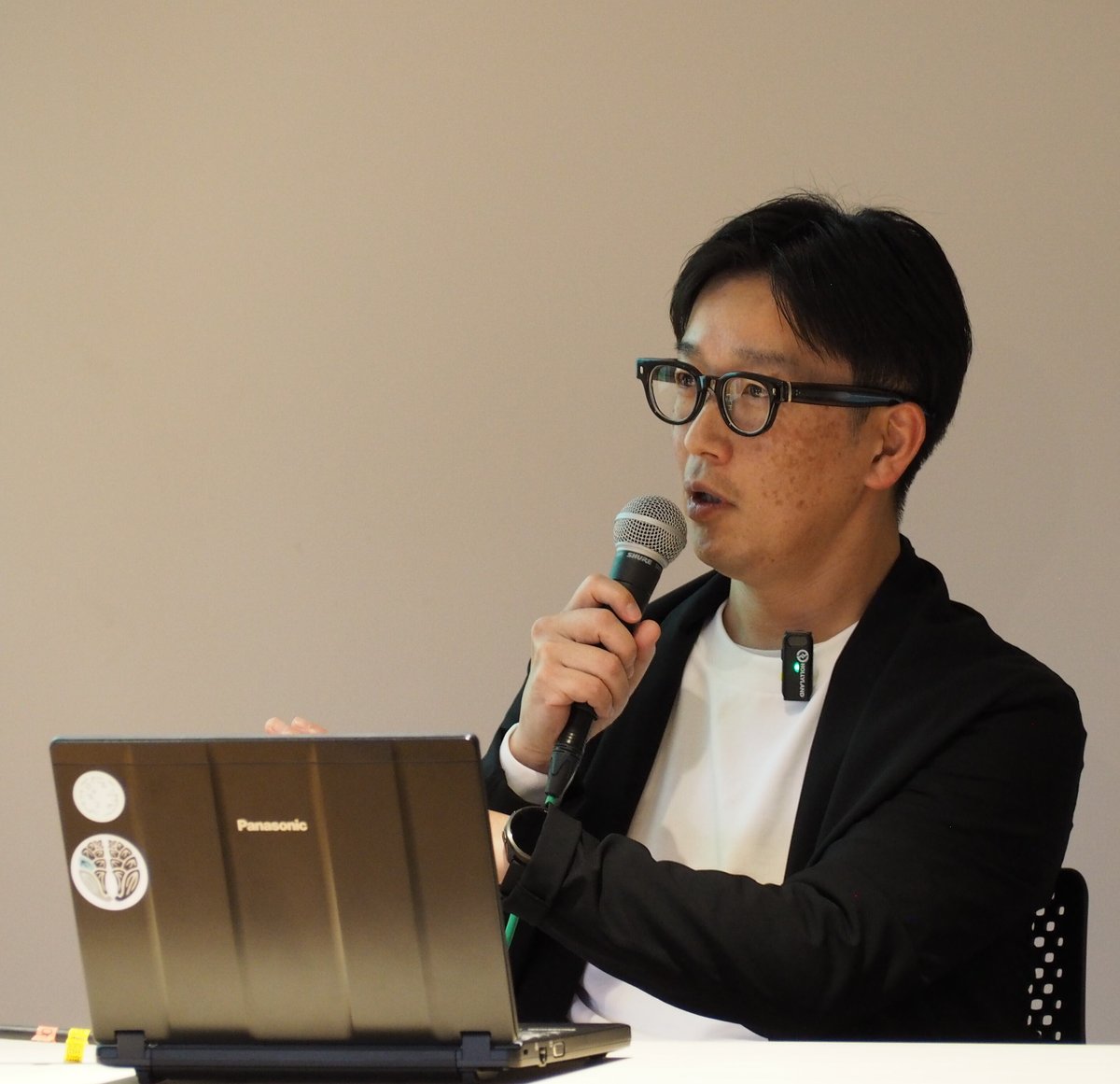
Mr. Kentaro Tada
President of Tadaya Ryokan, Wakura-Onsen Hot Spring. After graduating from university, he studied in the United States and then got a job at CyberAgent. He returned to the Ryokan in 2002 and worked at the Osaka and Tokyo sales offices for 3 years. In 2015, he assumed the position of the president as the sixth Tadaya. After serving as the youth manager of the Wakura Hot Spring Inn Association and the youth manager of the Ishikawa Prefecture Inn Association, he served as the chairperson of the working committee that formulated the Wakura Hot Spring Creative Recovery Vision after the 2024 Noto Peninsula Earthquake.
Talk Contents
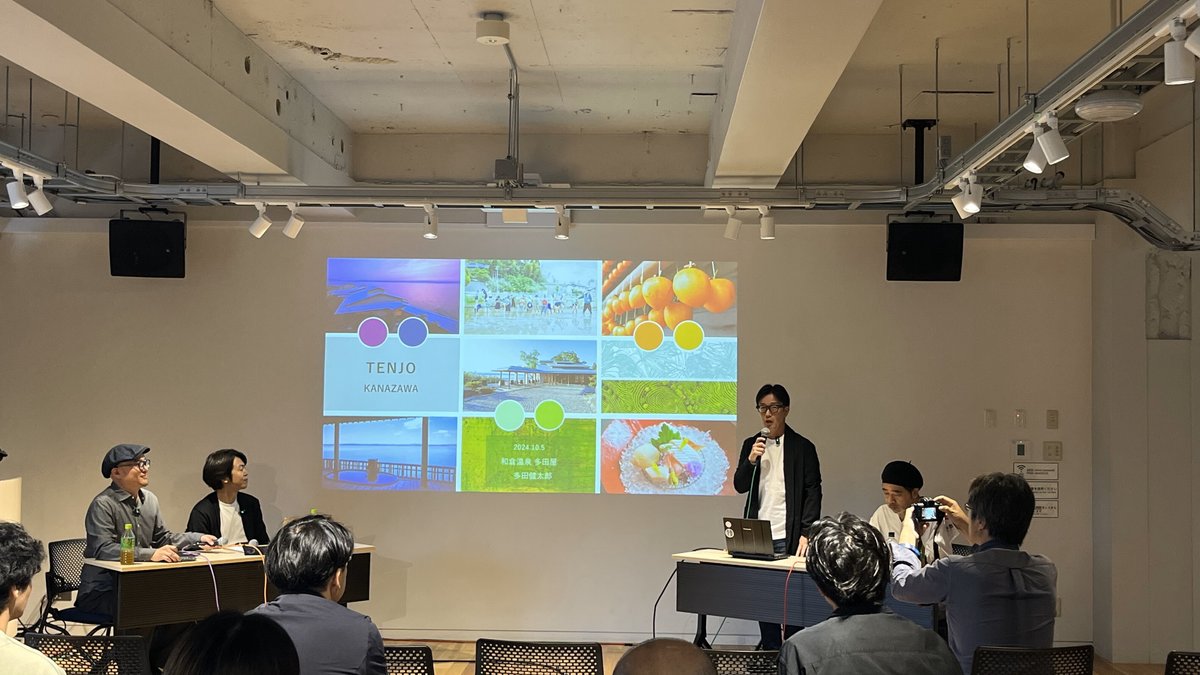
Thank you for the valuable opportunity today.
My name is Tada from Wakura Onsen Tadaya. I am also the representative of the "Wakura Onsen Creative Recovery Town Planning Council."
Today, I would like to talk about the current state of Wakura Onsen and community development while receiving questions from Mr. Miyata, Mr. Miyake, and Mr. Akeyama.
First, I would like to briefly introduce myself and what my background is. I lived in Nanao City until high school, and after I graduated from Rikkyo University, I went to America to study. Then I got a job at an Internet advertising agency in Tokyo called CyberAgent. In 2002, I returned to the Ryokan, but the company and the family business were completely different. When I said something like why there were so few meetings at the Ryokan, they looked down on me and told me to go to Osaka for training, so I stayed in Osaka and Tokyo for 3 years. During that time, I received a numerical goal to go around travel agencies as a salesperson and get groups, but as a secret mission, I had a mission to bring a young landlady, and I completed that and came back in 2006.
The following year, in 2007, there was the Noto Oki Earthquake, and I worked hard through various hardships, and in 2015, my father handed over the right of representation to me and I became the president.
In the ryokan, I worked as a youth manager of the hot spring cooperative and a youth manager of Ishikawa Prefecture. In February, after the disaster occurred this year, the national government asked young people to come up with a vision for Wakura Onsen, and 16 people were selected from ryokan, stores, chambers of commerce and industry, and organizations like JC. I don't know what my parent's generation is, but 16 people were selected randomly, and they were appointed sloppily, and it was sent to Tadaya. When I looked at the fax, it was written next to me as a committee chairperson. (Laughter) So, I am serving as a representative and committee chairperson, and now it has created a vision, To put that into a plan for community development, we formed a council, and I am the representative of that council.
Before the earthquake disaster, about 800,000 people visited Wakura Onsen annually. It is characterized by the high temperature of the source and a salty hot spring. There used to be 22 members of ryokan, but 1 of them quit because of the earthquake disaster, so now there are 21 ryokan. Among them, Tadaya is said to have been established in 1885, but when I researched various things after the earthquake disaster, there is a theory that it may be older, and it is said that it may be close to 200 years.
The inn was so close to the sea that you could fish from the pier or the guest rooms, and once you caught a fish, you cooked it and served it for dinner. However, because of the proximity to the sea, the damage to the seawall was so great due to the earthquake that the open-air bath is now completely tilted to the seaside. There were 60 guest rooms and about 70 people including employees and part-timers were working. On the day of the earthquake disaster, the piping was out of place and the side of the passage leading to the large public bath became like a waterfall, which made it impossible to use as an evacuation route. A local elementary school called Wakura Elementary School became an evacuation center, and I heard that 1200 guests and 800 local residents entered the facility where the capacity was less than 400. The very good thing about Wakura Onsen is that there are many people, including the residents, who have a spirit of hospitality because it is Wakura Onsen, and while food is scarce, it is me, me! or give me the futon! I heard that there was no such riot at all, and everyone spent the night helping each other. Our inn is broken in the middle, the sky is visible, the revetment is tilted, and the soil is being washed away. The hot spring district is also uneven .... The bumps still continue, and even after we fix them, they dented again and again, so there are still cases where people from outside the prefecture come to see it, and their cars get punctured.
Our original vision was "Inviting people to explore Wakura Onsen for Noto's ways of rural Living with mountains and ocean."
Among them, the six most important are "safety," "landscape," "livelihood," "sharing," "cooperation," and "life." We made a vision like ... but I don't think it is complete. We are just relievers, so it is an image that the children outline what they think is important when they make the next Wakura Onsen. Just yesterday, I went to a local junior high school called Kashima Junior High School and listened to what kind of future we want to make, and I have the image of updating with the children.
Process of formulating a reconstruction vision
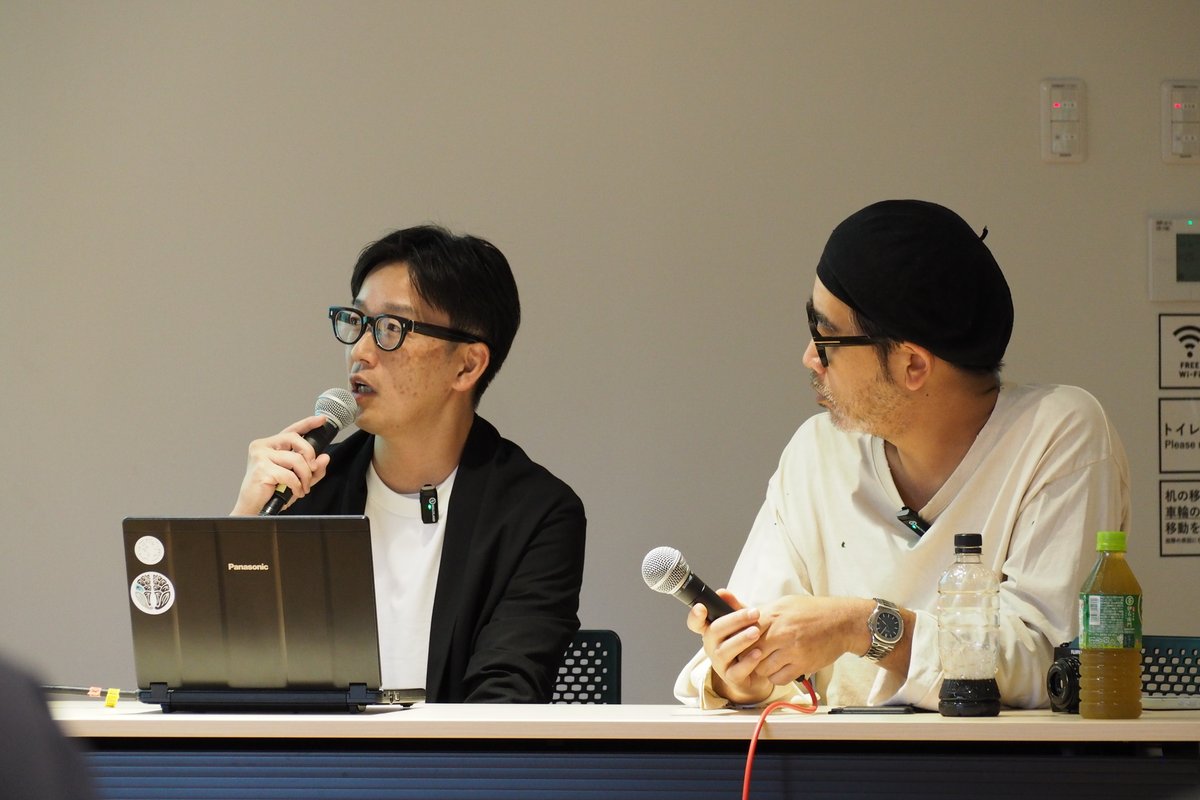
Mr. Miyake : Thank you, Mr. Tada. What was the process like to come up with this vision?
Mr. Tada : I was instructed to create a vision on February 6, and the first meeting was on February 8, two days later. There, about 100 people from the country will come to see if it's really okay, so I just received a request to hold a heated meeting for now .... Furthermore, the announcement will be on the 29th. The announcement date was already decided. I only have about three weeks to think about my vision... At that time, the water had not yet arrived, and we didn't know how much damage there would be, so everyone was really in a state of confusion and wondering what to do.
Mr. Miyake : Does the government tell you to make it?
Mr. Tada : It is difficult to say that the government gave the order, so I heard that the government said that it would be good to create one, but it was asked by the Hot Spring Cooperative or the tourism association. However, it is important to have a vision when starting community development, so I told my parents that if young people are asked to create one, they will not do it unless they let us do it.
Mr. Miyata : In such a critical situation, or in a situation where everyone doesn't know what to do, was it the timing that we had to ask various opinions from various people?
Mr. Tada : Well, we didn't know what to rely on. However, we were told to create a vision this time, and 16 people gathered to talk.
Until now, there had been no opportunity to talk about the future of the region with shops other than ryokan and young people from another Chamber of Commerce and Industry. Without this opportunity, the city would have been a place where parents had been trying to do for 10 or 20 years, so it was a timing that we would not be able to change unless we changed here.
Mr. Miyake : When everyone started talking like that, did they agree?
Mr. Tada : We had a lot in common! Not only the ryokan side but also the shops had to take over and build the town themselves, otherwise it would be impossible. All the young people shared a sense of crisis that they might not even be able to pass on to their children. But could they do it? There was a fear that they would be crushed by the parents' generation again and that they would just create the vision and do the rest.
Mr. Miyata : By the way, how does the parent generation crush you?
Mr. Tada : For example, we have to hold several meetings related to subsidies. We are called to include the opinions of young people, and what young people said was a good idea was completely ignored and implemented…
Mr. Miyata : Do they ignore you?
Mr. Tada : That's right. It has already been decided behind the scenes, but it is used in such a way that young people have to be included because of the formality.
Mr. Miyata : That's a little demotivating.
Mr. Tada : Yes, absolutely.
Mr. Miyake : After talking like that, do you think that this vision is filled with your thoughts?
Mr. Tada : Well, as a representative, I try not to express my opinions as strongly as possible…
Mr. Miyata : Aren't you holding back?
Mr. Tada : Well, I'm hesitant, but we have to put it together within the period. I think this catchphrase looks like a typical one at a glance, but I knew from the beginning that it would be very difficult to put everyone's thoughts into the catchphrase. They said various thoughts, such as the importance of hot springs, the economy needs to be turned around, and the town needs to be walked by everyone, but I was wondering how to put them together. At first, I thought it would be better to use dialects to express our feelings, but I couldn't remember a catchphrase that was too long, so I just received various orders. In the midst of this, I told the members that the word "Meguru" or “to go around” would be good. I thought the word “Meguru” could express various meanings in a multilayered way. "Meguru" could express the way visitors to go around the town, or to go around the entire Noto area using Wakura as a hub. “Meguru” could also connote “circulation” of economy or resources, or it could mean the blood circulation after taking a bath. We thought "Meguru" could be the keyword to put our thoughts together.
Town Planning in the Reconstruction of Noto
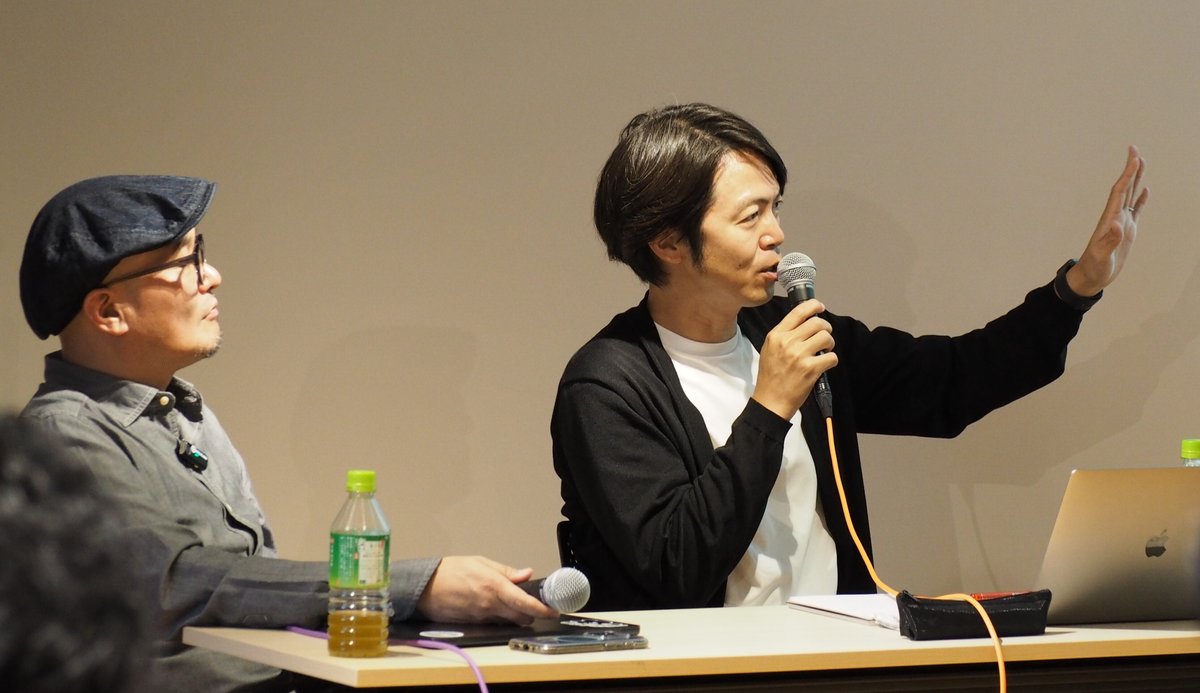
Mr. Miyata : This area is your specialty, Mr. Akeyama. Do you have any opinions or ideas?
Mr. Akeyama : I think that it is very difficult to do it in two days, such as the screening and the way in which people are made reckless... However, what I think is very wonderful when I am listening to you now is that the second phrase is for our children. I was listening to the story because I think it gives me great hope that people who have been crushed by the parents' generation are thinking about their children instead.
Mr. Miyata : Right. But don't you want to crush your kids when they grow up?
Mr. Tada : Well, I don't know how parents feel at all. I feel like they should come out soon. Even if we say young people today, the average age is over 40, they are not young at all. So, I would like to introduce people in their 20s or something a little more.
Mr. Miyata : Do people in their 20s live in the local area?
Mr. Tada : No, there isn't.
Mr. Miyata : When you say they're not there, are they not there in the first place or have they gone away?
Mr. Tada : In some cases, they have gone away. There are few places where there have been changes of ownership, and there are many places where there are no successors. Therefore, I think it will not be a problem that can be managed only by ryokan in the future.
Mr. Miyake : There are six themes as the basic policy of the reconstruction vision of Wakura Onsen, but even if you look at them briefly, it is difficult to try to do them. What do you think will be the core?
Mr. Tada : I would like to guarantee the safety of the town.
Since we recovered after this earthquake, it would be good if our customers and local people would feel safe when a disaster occurs in the future.
For example, we would like to aim for such a recovery, such as making inns more earthquake-resistant and recovering so that they can be used as a place of refuge in the event of something. But in reality, it doesn't quite work that way. As a town, we have a strong desire to recover and start a livelihood as soon as possible, so we look only at immediate issues and feel that we are not backcasting from the future we envisioned in February.
Mr. Miyake : Is there any way to improve such process?
Mr. Akeyama : Honestly, I think it's not easy.
I don't want to mislead you, but after all, there are many ways to do community development. In such a situation, I think it's great that there is one leader who is easy to understand like Mr. Tanaka in Maebashi.
However, in the current situation, it doesn't seem like such an atmosphere.
Do you feel that there are no people who are willing to do everything even if they sell their own money?
Mr. Tada : Well, the leader... For example, I am also a representative, but the hotel association has a representative of the association, the tourist association has a representative of the association, and there is a big ryokan called Kagaya in Wakura Onsen, so there are many representatives, so the administration is wondering where to inquire about this matter. And so on. If the inquiry is to the hot spring association, my father's generation answers, and if it is to the community development council, we answer, so the nuance is completely different and conveyed. I would like to play a leading role here, but we also do.
There is still a kind of turf war.
Mr. Akeyama : In such cases, community development is sometimes involved in the world of politics. To put it, if the term of office of the previous mayor changes in four years, they will deny what they did, or they will change what they intend to build. In the case of Maebashi, they have created a design committee. In short, even if the mayor changes, the policy of the committee will not change. It does not mean that the representative is doing it alone, but that we should create a consensual design vision and process and aim for it. What I wanted to tell you is that it is not good just to have someone wave the flag, but I think it is important to create an environment where everyone can form a consensus and properly observe what has been put together. I think that it will be important to form a consensus that everyone will do this, including a road map, without ending this with a theme.
Mr. Tada : I feel that cooperation with the city is not working well, and I can understand that the prefecture and country have the feeling that they want to do something about it, but there are quite a few cases in which they cannot move without the city's help. There is a mayoral election on the 27th of this month, so it is a really sensitive situation. If things go well, I think it is possible to protect this vision and the future of Wakura Onsen with the government a little more.
Key Points for Realizing the Vision
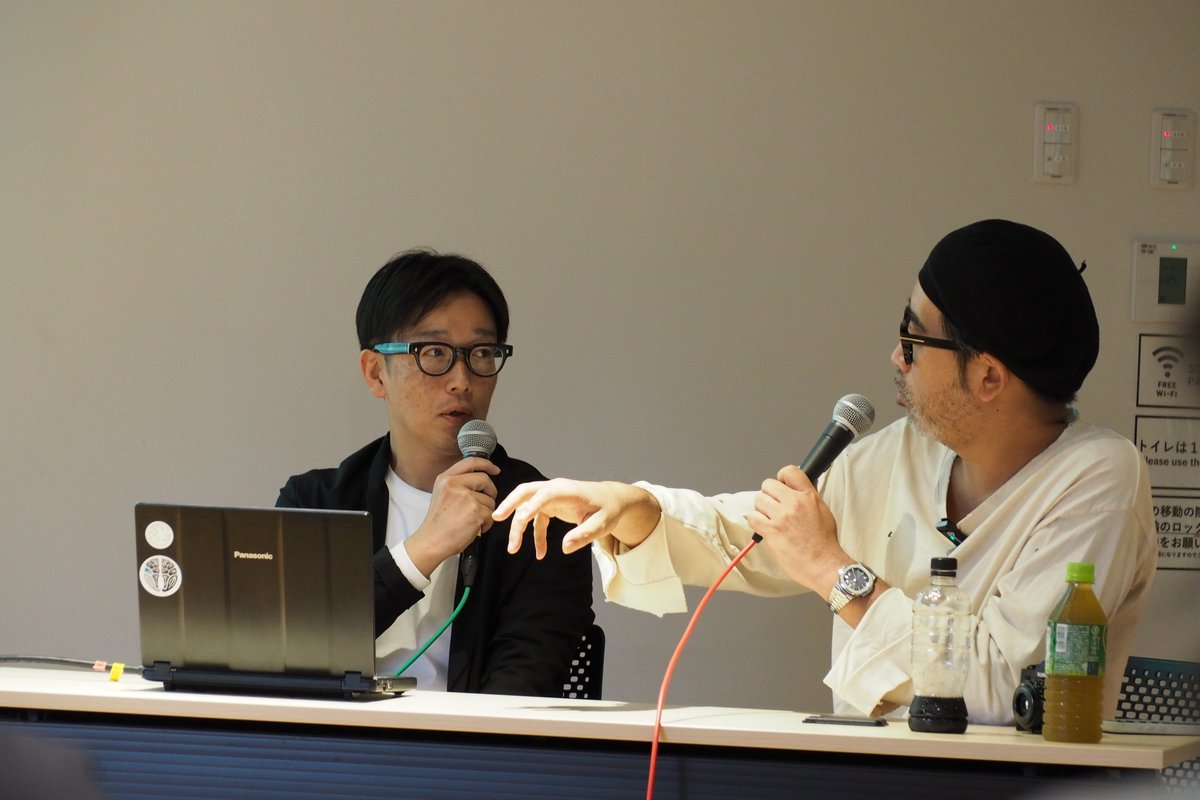
Mr. Miyata : Didn't you run for mayor?
Mr. Tada : Yes, I didn't.
Mr. Miyata : You should have run for election. But what about the next step to implement this?
Mr. Tada : I made the vision, but in the end, it is only words. For example, even if the words "shared" or "livelihood" are written, everyone must have different views on what kind of town this would become if it were put to use in Wakura Onsen, so I am working hard to visualize it when making the plan. Using that as a base, we will brush up with townspeople again.
This is the stage of making the plan now, and if people who can see it say, "I don't know the vision, but I like this town," then I think we will move about it. What do you think about this, Mr. Akeyama?
Mr. Akeyama : Well, It's important to be visible, and another thing I think when I'm working on creating a place is that you don't have to make the place suddenly. So, I think it's okay to do small events with this concept. There is a Japanese habit of wanting to create a box first. If the word "community development" comes to mind, it might be that we need to create something. But honestly, I think that the activities beyond the place are more important. So, if the word "strengthening disaster prevention for safety and security" is included in such activities, for example, today's story, I think it's important to take a step forward to start a disaster prevention campaign with everyone. That can be started without creating a place. I think it would be healthier for us to build a place in the order in which we think it would be better if we had a place for this kind of activity after building it up, as a process.
Mr. Tada : That sounds very good. What is the challenge now is that, although we say that we are mainly young people, we are talking with close members all the time, and as a result, people around us don't know what is going on. Some companies want to help, but I feel that there is a loss of opportunity because they don't know how to help. It is also difficult to make the problem all-Wakura because each of them has different phases. However, if we say that we are going to hold an event like this, I feel that there will be a lot more parts that we can do together, and if we talk about what we want to do through communication from there, I feel that it will be easier for companies who can help to get in.
Mr. Miyata : In that case, Ishikawa Prefecture is also promoting it, but hasn't it been done yet to visualize it through DX in local areas or to allow any citizen to see and comment?
Mr. Tada : Well, it doesn't look like that yet.
Mr. Miyata : But I feel that this issue is urgent. Especially now in Ishikawa Prefecture, I think it is urgent to use DX to share issues, visualize issues, and express opinions.
Mr. Tada : Until now, inns have not been close friends. They have a history of competing for customers and employees, so there is a base that they cannot talk openly. However, since there was such a big damage and everyone is already in a difficult situation, I think it will be impossible if we can't use this as an opportunity to work together horizontally. In the case of subsidies from the Japan Tourism Agency and others, if the information on how many customers are staying at Wakura Onsen is unclear, the results are difficult to understand, so it is difficult to provide subsidies. At the moment, we are sending faxes from each inn, saying how many people stayed this month, adding the ones written in pencil and saying how many people stayed...
Mr. Miyata : Is it still at that stage?
Mr. Tada : Yes.
Mr. Miyata : Is it the same for younger generations, not for parents?
Mr. Tada : Yes. The union sends you a fax and asks you to write it here and fax it.
Mr. Miyata : There is no fax machine in our office anymore.
Mr. Tada : Really? I use a lot of fax machines. So, in that sense, to aim for DX, including lateral cooperation, I think that inns must talk to each other to some extent. So, in community development, there have been two events called inn talks where inns get together and discuss what issues they have now.
Mr. Miyata : Do you think you'll get along a little?
Mr. Tada : Well, I've been working hard to get people to come to the table first, and they've managed to come to the table, but it's a little different hurdle to have a heart-to-heart conversation.
Mr. Miyata : I see. But if there is such a story only in the Ryokan and other industries, there are many other industries, and it is a very difficult task to gather opinions in order to do community development.
Mr. Miyake : That's right. In addition, you are talking about Wakura Onsen now, but you are talking about expanding to other areas in Noto, your vision is very wonderful, but how to realize it is difficult.
Mr. Miyata : But I think there were probably many people in the example of Mr. Akiyama's "GREEN SPRINGS." too.
Mr. Akeyama : Yes. But in the case of "GREEN SPRINGS," it is one company. So, if the representative gives a GO, we can get on with it.
Mr. Miyata : But there were a lot of challenges?
Mr. Akeyama : Yes, of course.
Mr. Tada : Mr. Miyata just mentioned a good point. In that sense, Wakura Onsen is not one town, and we want to make it into one team somehow. Also, if you look at the Noto Peninsula, I think it was divided among municipalities. I was wondering if we could make a kind of horizontal collaboration through the disaster reconstruction. In Wakura Onsen, we wanted to send the baton to young people, and people like me came out. I thought that people like that would come out in other areas, but they didn't. In the end, if the reconstruction plan is different among administrative areas, I thought it would be a waste to separate them. So, through horizontal collaboration with Wakura Onsen as a hub, I was thinking of allying with people who are working hard for reconstruction in the region, and creating a system to do what can be done horizontally. However, there was heavy rain, and now it is very difficult to do reconstruction or horizontal collaboration. I was working hard and looking forward, but then a flood disaster happened, and I felt like my heart broke. It is really painful.
Mr. Miyake : You said that you asked the opinion of junior high school students yesterday. Did you do that at some places?
Mr. Tada : No, this is our first attempt. I created a vision for the town of Wakura earlier, but I think that the thoughts of children are not being picked up. If I were a child, instead of choosing whether or not to live in a town that my parents created and called a vision or reconstruction, I hope that they would come to hear it when they were children and grow up with the thought that it was reflected in the town. I think that it is possible to create something through the reconstruction, such as a small confidence that we can change the town or create the future. I went to ask them what that is, and they want to build Aeon or Mac. Specific things came out... But I thought that in the end, there are not many places that children can enjoy that are visible and easy to understand.
Mr. Miyata : In the past, when I went to a local city, there was a lot of charm that only existed there, but now, no matter what local city I go to, I can only see the same scenery. That's what you just mentioned, Aeon or Mac.
That's all I can think of because they don't know. I think this is a very sad thing, so it must have lost its character.
Mr. Tada : Mr. Akiyama, please give me your answer.
Mr. Akeyama : The answer won't come out right away. But, again, listen to the opinions of children. I hate to say this, but it may be that they want Aeon, but as you mentioned, they want a fun place behind it. It is important for adults to properly convey to the community that such things are attractive in a good way, and I think that children may notice something in that way. I think that is a very important point.
Mr. Miyake : As Mr. Akiyama said today, how about taking junior high school students to places where such a town was built? I think it would be interesting to have such an opportunity to experience some examples of such stories, such as how such a town was created by thinking about such things, and what the children would feel. I don't have an option right now, so let's just say it.
Mr. Miyata : I don't think children can imagine things they don't know at all. I think they can see or experience something once and expand their imagination from where.
Mr. Tada : If I go to a town that has experienced such reconstruction for inspection, I think it would be better for children to talk with each other, not adults. If they tell me what changed, what was good, what value they realized, etc., I think they will probably go back and look for it, so I think such an experience would be great.
Mr. Miyake : Indeed. When I lived in the United States, some people ran a program for high school students who experienced the Tohoku earthquake to learn leadership for about a month. In the beginning, we talked about it very hard, but after talking with other people and being in a completely different environment, there was something to think about. After that, we heard the news and found out that they had started something like this when they came back to Japan ... So, if we could create an environment where the ideas of the next generation could come out, I felt that I could have hope.
Mr. Akeyama : Children have a lot of possibilities. I experienced this when I was in my previous job. Kamishihoro-cho town in Hokkaido is a peaceful place with about 4,000 people and 20,000 cows. But the elementary school was closed in 1975. The company I used to work at ran a forest school to promote migration, and my family participated in it. I was single at the time, but the families of employees and other people who wanted to go there were about 10 groups. I was included in the group and went there. The impressions of the children in the questionnaire before and after going there were very interesting. Before going there, Asahiyama Zoo was included in the nearby course, and when I asked them what they enjoyed going there, they were ranked first. But when I came back, what I would write was that I enjoyed playing with the local children the most. Then, the children over there know more about playing in the snow, but children become more fun while playing with each other. When I listened to them, the next time the local people told me about it from the employees over there, I learned that our town is interesting in this way. On the contrary, they realized that what they had taken for granted was valuable. It is the same with the disaster-stricken areas. I visited Noto Island yesterday, and after that, I went to Noto Island. There are things that you cannot understand unless you come. But if there is an opportunity for children to interact with each other, I wonder if the children will be able to realize their good things. I don't know the true value until I experience it like that.
Mr. Tada : At the event held at the junior high school yesterday, it was of course one task or purpose to get the opinions of the children out, but I also had another purpose to have the thoughts of the children heard by the adults in the area. So, not only the people from the reconstruction team, but the school consists of three school districts, so I asked some parents from each school district to come and act as facilitators and hear from the children, and the children thought like this, and even though I thought I knew it, I didn't have a chance to put my knees together properly until now due to the earthquake disaster, I think one of the things that I gained yesterday was that I could not only get such awareness from the children, but also convey it to the people in the area.
Mr. Miyake : Lastly, I have one question for Mr. Tada. I imagine that people from outside are also involved in the reconstruction of Wakura Onsen. I would like you to tell me what kind of involvement is good or what is working well now.
Mr. Tada : After the earthquake, there are still many parts that are not working well. I am sorry that it is closed. There are some parts that we do not have the manpower to put out information well.
For example, some people can mediate between elderly people and young people, and people who can disseminate information well. Also, the phase changes every week, so if we do not know what is going on now, we will get late information or wrong information, so we are in a situation where there are no people who can detect such things well. There are no people like project managers.
In the case of Tada Ryokan, we originally had staff who came to work from outside the prefecture, so it has not been realized, but we were thinking of a project to exchange staff with sake breweries for a certain period to let those people know about Noto. At Tadaya, we had people learn what kind of sake is chosen by what kind of customers in what kind of situation, and the staff of Tadaya went to the sake brewery to learn what kind of thoughts they are making before coming back. We have said that it would be interesting if we could do such a trade, so I hope we can do it again.
Summary
In the Part2, we invited Kentaro Tada, President and CEO of Tadaya Ryokan Wakura Onsen under the theme of "Town Planning ✖ Noto Reconstruction," and explored new perspectives on the future of Noto with Mr. Miyata and Mr. Miyake, representatives of CLL and Mr.Akeyama of GOODTIME Inc.
There are many challenges to be faced due to the heavy rain disaster during the reconstruction process, but I hope that we can start small activities like Mr. Akiyama's advice, reflect the opinions of the children, and make a little progress toward the future.
Thank you very much for participating with many people this time.
Let's continue to support Noto!
★The Part2 is here ↓
